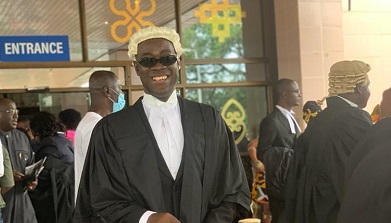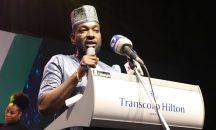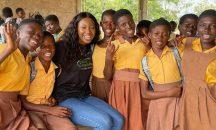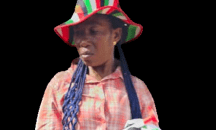From devastation to glory… Bitter-sweet story of a lawyer who is blind

How would you feel when you woke up early in the morning and realised you were losing your sight – in other words, going blind in both eyes?
This was how it all started for an ambitious young man – Jones Odame, who was dreaming to become an investigative journalist or lawyer.
Dejectedly, on Monday, March 5, 2007, that lofty dream took a devastating blow in the face when Jones, the second-last of eight siblings, woke up with a blurred, grey and dim vision.
Later, the eyes were gone. He could see no more! It was such a torturing experience.
But how did he survive life’s out-of-the-blue turbulence? How did he soar down to the sea and float on it?
Wait a minute. We shall come to that survival story.
Born some 39 years ago to Mr T.G Akyea and Madam Gladys Asantewaa, both of whom hail from Anum – an Akan community in the Asuogyaman District of the Eastern Region, Jones began his basic education at Akwatia – also in the Eastern Region – and continued at the Anum Presbyterian Senior High School from where he proceeded to the Peki Teachers Training College in the Volta Region.
On completion, he taught for two years at Akim Akroso, also in the Eastern Region, until disaster struck one fateful Monday morning.
“I had woken up one Monday morning to prepare for a church programme, as I was the District President of the Young People’s Guild (YPG) in the Nsaba District in the Central Presbytery of the Presbyterian Church of Ghana, when I realised I was going blind,” he recalled.
Immediate reaction: Ceaseless and intense prayers were offered by church members in search of a miracle. Nothing happened.
Tremulous and utterly confused, Jones hurriedly left Akroso on Friday of the same week for the Emmanuel Eye Clinic at East Legon in Accra, which had been recommended to him, in search of solution to the fast-fading sight.
“There, the doctor also directed me to the Korle-Bu Teaching Hospital for further assessment after which I was booked for theatre the following Tuesday for a supposed correction of my sight.”
The operation was done. It was retinal detachment repair of the eyes after which he had to spend about a week in the recovery ward.
Finally, the D-day came for the eye shields or bandage to be removed – amid tension and anxiety that had crammed up the ward. His family and friends had come to offer a world of support to him, hoping for the best.
But alas Jones could not regain his sight after the eye-pad had been removed.
“Can you see? Can’t you see anything? Can you see me?” These were words from the eye surgeon that only met a reaction of tears and desolation.
“It was not an easy thing to be told I couldn’t see again for the rest of my life. I was really, really wrecked, heart-broken and devastated,” Jones recollected.
The doctor then advised him to go to the School of the Blind at Akropong in the Eastern Region, since there was “absolutely nothing” that could be done about his situation.
Hardly hit, members of his church at Akroso including one Mr Amponsah, Auntie Mariam from the Netherlands, Kwaku Odame (not his brother) and Reverend Bekai, got some doctors from the USA to confirm that his eyes were truly damaged.
After several failed attempts to restore his sight, Reverend Bekai introduced Jones to a former Head of the School for the Blind, to try to conscientise and introduce him to the Braille. Braille is a form of written language for people who are blind, in which characters are represented by patterns of raised dots that are felt with the fingertips.
“It was there that I realised I had to accept my situation willy-nilly. Indeed, I cried my head off the very first time I touched the braille.”
However, after realising that there was nothing he could do, Jones – as he is affectionately called, begrudgingly agreed to settle for the School of the Blind, where he was first admitted into the Rehabilitation Class.
The Rehab Class is meant for those who were not born blind.
There, he saw a couple of people who had his kind of story including the Counsellor, a Masters Degree holder.
“You can be whatever you want to be in this world through the braille; so don’t be discouraged at all,” were the words of encouragement from the counsellor.
According to Jones, he was hugely motivated by that admonition – and though a year’s course or more, “I spent only two months reading and writing perfect braille.”
With his confidence fully restored and thinking there was no time to waste, he applied and was admitted into the University of Ghana, Legon, to study Political Science and Sociology in 2007.
After four years of diligence, Jones emerged with flying colours – chalking First Class in his area of study.
And, as destiny may have it, he landed at the Commission on Human Rights and Administrative Justice (CHRAJ) in Accra for his one-year National Service.
“It was there that I realised one of my childhood dreams to be a lawyer was on course.”
So, in 2014, he applied to the University of Ghana School of Law, where he passed an entrance examination to pursue a Bachelor of Laws degree (LLB) – completing in 2016.
Thereafter, Jones gained admission into the Ghana School of Law (Makola), but had to defer the course for two years after the 2016-2017 academic year, owing to reasons he said, were personal.
He, however, bounced back ‘gallantly’ in 2020 to complete his course and was called to the Bar on Friday, October 1, 2021.
The day was a historic one for Lawyer Jones Odame as he was given a standing ovation by the Chief Justice (CJ) Kwasi Anin-Yeboah, the former CJ Mrs Georgina Theodora Wood, the Attorney General and Minister of Justice, Mr Godfred Yeboah Dame and an array of eminent justices, when his name boomed from the ‘loud speakers’ as among the 278 lawyers called to the Bar. Apparently, his story was known to all of them. They know it has taken him a Himalayan effort to make the journey.
This year’s event – held at the International Conference Centre in Accra, was the 58th Anniversary in the history of enrolment on the Roll of Lawyers.
“It’s been a hard, tortuous journey, but thank God I have been able to achieve my childhood dreams,” an elated Lawyer Odame, who is married with two children (twins), told The Spectator.
He advised the visually impaired or those who unfortunately find themselves in his situation, not to give up but strive hard to achieve their goal.
“You don’t have to take your life or throw up your hands in despair when confronted with a situation like mine. Life itself is not easy, but with focus and that intrinsic motivation, you can achieve your dreams,” he asserted.
Lawyer Odame took the opportunity to express his appreciation to the Director of the School of Law, Mr Maxwell Opoku Agyemang, the two Registrars of the school and his 2016-2017 Year Group, adding that “this success wouldn’t have come without their encouragement and financial support.”
For now, Lawyer Odame is dreaming of working with the United Nations to champion issues relating to disability.
“Having lived as a sighted person and now as a person who is blind, I have become passionate on issues relating to disability and how they are handled in our society – and will, therefore, wish to work with the UN or any reputable NGO which mandate is to promote the welfare of persons with disability.”
By John Vigah















